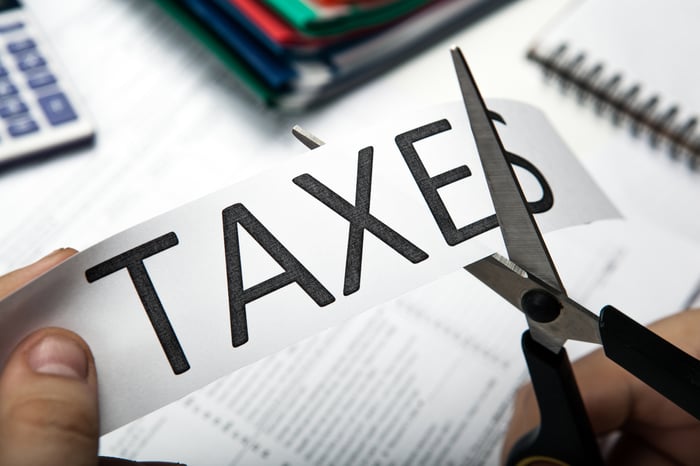Without beating around the bush, let me just say what's on all of our minds when it comes to taxes: They stink! No one likes preparing their taxes or handing over their hard-earned money to Uncle Sam. It is, however, a necessary thing we do as working Americans to ensure that the federal government has enough incoming revenue to support social programs like Social Security, Medicare, and Medicaid, as well as other vital expenditures, such as defense, transportation, and education, to name a few.
But depending on where you call home, your federal responsibility only tells half the story. There are 43 states that also collect tax on various forms of income as of 2018. Of these states, 41 have a tax on wage income, while another two -- New Hampshire and Tennessee -- tax dividend and interest income to some varied degree. This means that there are seven states that have no income tax whatsoever right now, and by 2021, an eighth state will be joining the ranks.

Image source: Getty Images.
These states have no income tax
Listed alphabetically, here are the seven states you could live in right now without having to pay tax on your wage income.
1. Alaska
Alaska is one of the most tax-friendly places to live in the U.S., and is the only state to have no levied sales tax or state income tax. This means retirees can escape having any of their retirement income or Social Security benefits touched by the state of Alaska. To boot, senior homeowners over the age of 65, or a surviving spouse over age 60, are exempt from municipal taxes on the first $150,000 of assessed value of their home. The downside, the winters can be a bit harsh in Alaska, and access to medical care could be dicey if you don't live near one of its few major cities.
2. Florida
Florida is an especially popular destination for retirees, and with good reason: There's no state income tax, and therefore no tax on any retirement income. Long-time residents may also privy to a homestead exemption of up to $50,000 on their property, depending on the city or municipality in which they live. If there is a double-edged sword in Florida, it's the weather. Florida's temperate climate is perfect for folks of all ages, but it also gets hit by hurricanes more than any other state, leading to the highest home insurance costs in the country.
3. Nevada
Residents of Nevada are sure to feel like they've struck the jackpot given that it has no state income tax, as well as a relatively low state-levied 5.5% sales tax. Though there are no exemptions on property tax, Nevada's property tax rate is well below the national average. With the biggest downsides likely being its very toasty summers, or its limited access to specialized medical care if you live outside of its very few major cities, Nevada has a lot to offer folks of all ages.

Image source: Getty Images.
4. South Dakota
The home to Mount Rushmore is another state where your income can potentially stretch a bit farther. South Dakota has no state income tax, and its state-levied tax is just 4.5%. Additionally, an analysis by Money has shown that South Dakota has one of the lowest costs of living in the nation, allowing those with low- or mid-level incomes to stretch their dollars. Though median home prices are lower than the national average, property tax rates (as a percentage) are a bit higher than the national average, and South Dakota's relatively sparse population could make specialized medical care a bit tougher to come by.
5. Texas
The Lone Star state is a popular destination for those who despise income taxes, as well as retirees who don't want their retirement accounts touched. Homestead exemptions on property taxes are open to all residents of the state, with seniors over the age of 65 potentially qualifying for extra breaks. On the downside, Texas hits its residents with a pretty hefty 7% state sales tax, and its median property tax is high on a percentage basis, relative to the national average.
6. Washington
Calling the Evergreen State home comes with the sizable perk of no state income tax. This means Washington can't touch any of your retirement income, should you choose to retire there. Its temperate climate, where all four seasons are represented, is another plus. However, Washingtonians should also prepare for a substantial state and local sales tax burden, as well as reasonably high nominal property tax bills, primarily as a result of higher property values than the national average.

Image source: Getty Images.
7. Wyoming
Wyoming may have saved the best for last, because in addition to no state income tax, and therefore no tax on retirement income, its residents also face one of the lowest combined state and local tax levies in the country. Wyoming's oil- and mineral-rich land provides an ample revenue stream, which means not having to pilfer the pockets of its residents via taxation. Even property taxes in Wyoming are well below average, with numerous relief programs in place. If there are downsides, it's the state's harsh winters and potentially sparse access to specialized medical care.
8. And by 2021: Tennessee
Finally, by 2021, the Volunteer State will also be income tax-free. As of right now, the Hall income tax allows for a relatively low tax rate on dividends and interest income above an exempted amount. In 2018, the Hall income tax rate is just 3%. Next year, it'll be 2%, By 2020, just 1%. And beginning on Jan. 1, 2021, it'll be completely phased out, allowing residents to keep all of their interest and dividend income, as well as avoiding state tax on wage and retirement income. When coupled with its relatively low property taxes, Tennessee could become popular with retirees. Just one downside to note: Its combined sales and local tax rate is among the highest in the country.






